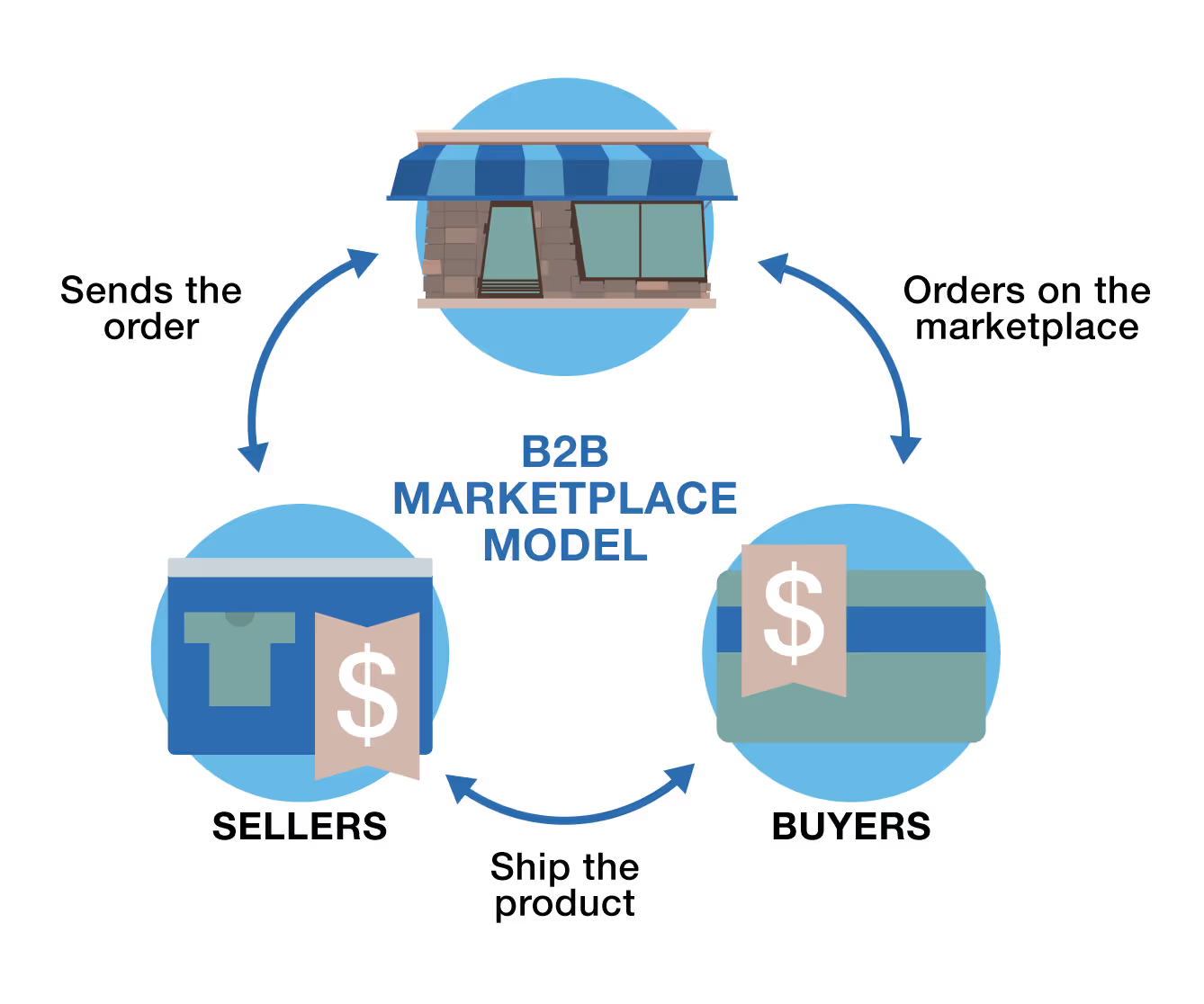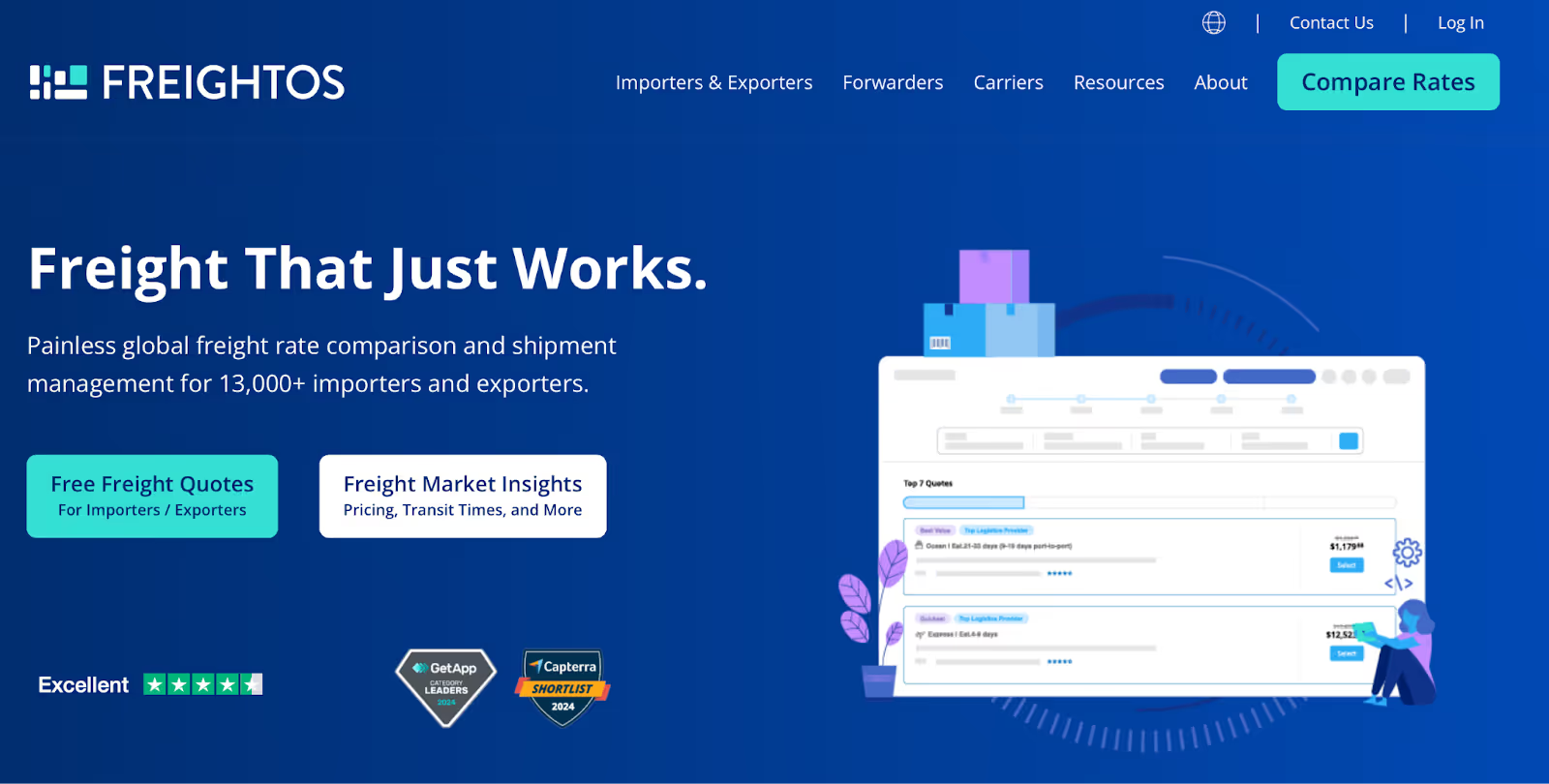The 3 Most Common B2B Marketplace Models and their essential features

The B2B e-commerce market is exploding with a global scale reaching $17.9 trillion in 2021, more than 5 times larger than the B2C market. Businesses are increasingly turning to B2B marketplace channels to buy and sell goods and services, opening up huge opportunities for startups who know how to capitalize on this trend. However, for founders building B2B marketplaces, choosing the right operating model from the start has strategic significance.
This article will deeply analyze the 3 most popular B2B marketplace business models and their distinctive characteristics and features (B2B marketplace features) that help them operate effectively. Additionally, we'll discuss Sharetribe's role in helping startups build B2B marketplaces quickly and cost-effectively, as well as Journeyhorizon's experience deploying 60+ marketplaces globally – a trusted technical partner for startup enterprises.
Top 3 popular B2B marketplace models and must-have features
Building B2B marketplaces successfully requires founders to identify the right business model from the beginning to develop long-term business and marketing strategies. Each model has its own characteristics, requiring specific features right from the MVP stage. All are presented in detail below.

#1: Product B2B Marketplace model
Product B2B Marketplace is a marketplace model that connects buyers and sellers of physical products or tangible assets.
Typical examples include the Alibaba platform connecting businesses for global goods trading, or in the automotive parts industry, PartsTech – a B2B marketplace helping 15,000 auto repair shops connect with 30,000 parts suppliers.
This model operates similarly to e-commerce platforms but focuses on business-to-business transactions (instead of business-to-consumer).

Essential Features for Product B2B Model:
- Comprehensive Product Listings: Allow sellers (manufacturers, distributors) to upload products with detailed descriptions, inventory, unit prices, and wholesale conditions.
- Tiered Pricing: Automatically display quantity-based pricing discounts, suitable for large-scale transactions.
- Price Negotiation Tools: Support direct negotiation between buyers and sellers on the platform with transparent processes.
- Supplier Search & Comparison: Allow buyers to compare multiple suppliers based on technical specifications, price, and shipping conditions.
- B2B Cart and Order Management: Support large-quantity shopping carts, integrate multiple SKU selection simultaneously, and custom payment terms.
- Logistics Integration and Inventory Management: Synchronize warehouse data, automatic shipping cost calculation, and support logistics partners.
#2: Service B2B Marketplace model
Service B2B Marketplace is a model connecting 'businesses with service needs' with 'professional service providers'.
Instead of tangible products, the transaction objects are services, skills, or labor time.
Typical examples are freelance platforms like Upwork, where companies hire freelancers to complete projects, or Freightos – a B2B marketplace connecting businesses with international freight service providers.

Essential features for Service B2B model:
- In-Depth Provider Profiles: Provide detailed profiles about capabilities, skills, experience, customer reviews, and professional certifications.
- Service Proposal Creation and Submission: Allow buyers to post requirements and providers to send quotes, proposals, or apply for projects.
- Online Communication & Collaboration: Integrate chat, video calls, and file sharing for detailed exchanges before contract signing.
- Flexible Payment Options: Support hourly payments, milestone-based payments, or secure escrow.
- Two-Way Rating System: Increase trust through post-transaction reviews from both hirers and providers.
- Project Management and Progress Tracking Tools: Help track deadlines, work status, and automatically remind of important milestones.
#3: Procurement/RFQ model
This is a reverse marketplace model: instead of sellers posting products/services to invite offers, buyers proactively post purchasing needs or projects for hire, then suppliers send competitive quote proposals.
This model is commonly seen in industrial procurement or large-scale supply chains, where each order has high specificity (e.g., purchasing custom manufacturing components, ordering custom project design services).
RFQ (Request for Quote) means quote request – the core feature of this model allows buyers to describe detailed needs (products/services, quantity, standards, deadlines...) and receive multiple quotes from sellers. The platform can additionally support online bidding or reverse auctions for buyers to select optimal suppliers in terms of price and capability.
Example: Thomasnet - marketplace connecting with over 500,000 verified suppliers in mechanical, manufacturing, electronics, plastics industries...

Essential features for Procurement/RFQ model:
- Flexible RFQ Creation: Provide detailed forms for businesses to post purchasing/service needs with technical criteria.
- Quote Collection and Comparison: Automated system aggregating quotes from multiple suppliers for easy buyer comparison.
- Approval and Award Process: Support internal business approval permissions, supplier selection process, and contract signing.
- Reverse Auction Integration: Allow online bidding organization with downward price competition to optimize purchasing costs.
- Bidding Document Storage and Retrieval: Secure bid files, contracts, transaction history – ensuring compliance and easy traceability.
- ERP and Supply Chain Management System Integration: Synchronize procurement processes with business internal systems.
Sharetribe: Smart and Cost-Optimal Solution for B2B Marketplaces
Instead of developing everything from scratch, many smart startups have chosen to use Sharetribe - the world's leading marketplace SaaS platform. With headless architecture and API-first approach, Sharetribe brings the perfect combination of deployment speed and customization capability.
Outstanding Benefits of Sharetribe
- Time and Cost Savings: Startups can save up to 90% of development time and costs compared to building from scratch, allowing focus on market development.
- Ready B2B Features: The platform provides a complete set of essential features for B2B marketplaces such as listing management, booking, payments, reviews, and most importantly the Transaction Process Editor - a tool that allows customization of complex transaction processes.
- Flexible B2B Transaction Processes: You can easily build transaction steps suitable for B2B such as quote requests, negotiations, contract acceptance, delayed payments, and digital signature integration.
- Scalable Cloud Infrastructure: Sharetribe operates the entire infrastructure, helping startups not worry about load capacity or security at large scale.
- Scalability: Powerful APIs allow integration with other systems (CRM, ERP) or adding unique features as startups develop.
Explore how to build a B2B marketplace with Sharetribe here!
Journeyhorizon – Sharetribe's Leading Strategic Partner
Whether you're building on a platform like Sharetribe or going fully custom, the success of a marketplace project still heavily depends on execution capability and the experience of the implementation team. This is where an experienced technical partner can make all the difference.
In the global Sharetribe ecosystem, Journeyhorizon holds a special position - not only as one of the most reputable Implementation Partners but also as an Expert Partner officially trusted and recognized by Sharetribe.
Our Strengths:
- Deep Platform Knowledge: As one of the few partners able to leverage 100% of Sharetribe's power, from basic features to the most advanced capabilities like Custom API Development, Advanced Transaction Flows, and Enterprise Integrations.
- Cross-Industry Experience: 60+ successfully deployed marketplaces spanning from B2B services, rental platforms, to enterprise procurement - each project bringing unique insights on optimizing Sharetribe for specific verticals.
- Global Perspective, Local Execution: With a client portfolio from North America, Europe to Asia, we understand the unique challenges and opportunities of each market, especially the specific needs of Asian businesses.
Journeyhorizon doesn't just "build and deliver." We are growth partners accompanying clients through every stage of the marketplace lifecycle:
- Pre-Launch Strategy: Market research, competitive analysis, business model optimization, and go-to-market planning based on data from dozens of similar successful marketplaces.
- Launch Excellence: Comprehensive testing, performance optimization, user onboarding flow design, and crisis management protocols to ensure smooth launch.
- Post-Launch Growth: Continuous optimization based on user behavior analytics, A/B testing key conversion funnels, and strategic feature development to maintain competitive advantage.
- Scale Preparation: Infrastructure planning, team expansion advisory, and strategic partnership facilitation when marketplace is ready for the next growth phase.
Final Thoughts
Understanding and choosing the right B2B marketplace models not only helps entrepreneurs identify the right path to take but also know how to choose the right partners for success.
In that marketplace startup journey, Sharetribe can be the most optimal platform when providing powerful and cost-effective foundation. Meanwhile, Journeyhorizon brings practical experience and proven strategies. This combination creates the optimal solution for startups wanting to quickly realize their B2B marketplace ideas.
If you're still unsure where to start, contact Journeyhorizon today to reshape your entire idea and journey!



